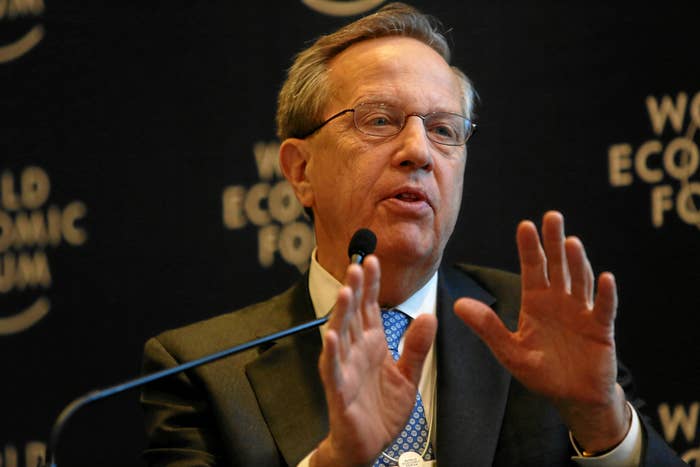
When online education platform Coursera announced Monday that it had snagged the former president of Yale University, Richard Levin, as its new CEO, the play seemed obvious: An ambitious startup that has attracted its fair share of skeptics was buying credibility from one of the world's most prestigious universities.
But Levin also brought another card to Coursera, a leading provider of massively open online courses, or MOOCs: He has deep connections to China, including the Chinese government, and years of experience leading expansion into Asian markets. At Yale, Levin led a partnership with Peking University, served on the board of the nonprofit National Committee on United States–China relations, as well as oversaw the university's controversial partnership to open a campus in Singapore.
Less than a week into his tenure as Coursera's CEO, Levin is already touting the "tremendous potential" for his company in China. In an interview with BuzzFeed, he called it "inevitable" that China will become the company's largest market. (It is currently third, behind the United States and India.)
"It's a highly literate population, but only a fraction still have access to higher education," Levin said.
Levin also cited his connections with the notoriously difficult Chinese government as an asset to Coursera. "It will help that I've worked quite a lot with the Chinese administration," he told BuzzFeed.
Attempts to move higher education online have been around for more than a decade, but MOOCs (the term was coined in 2008) — whose content range from video lectures to webbier and more interactive forms — have been on a roller-coaster ride since the moment in 2012 when they were widely hailed as the savior of overpriced American higher education. The New York Times declared 2012 "The Year of the MOOC," heralding the platform's potential to split open the world of higher education by allowing students access to online courses taught by professors at prestigious universities like Harvard, Yale, and MIT.
Then, in 2013, a series of troubling statistics brought MOOCs plummeting back down. As it turned out, according to a study released by the University of Pennsylvania, only about 4% of people who signed up for Coursera's classes competed them (although the number jumps much higher when you consider only those who make an effort to complete the first assignment). Most of their users were also relatively well educated, male, and wealthy.
Entrepreneur Sebastian Thrun, who founded Udacity, claimed in 2012 that the MOOC model would disrupt higher education to the point of leaving just 10 institutions of higher education standing.
That rhetoric has mostly faded: In the wake of a study finding that students learned much better with in-person courses than his offerings, Thrun later announced that many of Udacity's courses were "lousy" and that his company would be transitioning to a corporate-training model in place of traditional higher-ed offerings.
Levin's hiring is just one signal that MOOC providers are catching on to the fact that online courses have a particular attraction in countries like China and India — one that may not be as desirable in the United States, where in-person education and solid credentials are more readily available. And several of Coursera's current partners — which include prestigious U.S. universities like Stanford, Yale, and Princeton — have names that hold even more weight in Asian countries than in the United States
Coursera is not the only MOOC provider that has been thinking increasingly globally, especially when it comes to China and India. Its main competitor, edX, a nonprofit joint venture between Harvard and MIT, opened its platform in October to Chinese giant Tsingshua University. The venture, called XuetangX, is now China's largest online learning portal.
Both organizations have been furiously translating their course offerings through a variety of mediums, as well as seeking out partnerships with Chinese universities. Tsingshua and Peking University both host courses on Coursera's platform, along with more than 100 other partner universities. EdX even formed a new partnership with the queen of Jordan, Rania Al Abdullah, to create "MOOCs for the Arab world."
Anant Agarwal, the founder of edX, said students in China, India, and elsewhere in the developing world are "stuck between a rock and a hard place," with limited access to education but facing a demand for skills from U.S.-based and other employers.
"There's a huge untapped desire for high-quality courses," Agarwal said.
The companies have yet to turn the new markets into booming businesses. So far, Coursera, Udacity, and edX all have just one main source of revenue: charging students for a subset of their offerings, especially certificates that verify they have taken the class. All three providers say that at the moment, there's much less demand for those certificates internationally, largely because of lack of funding.
But Coursera has made it clear that right now, it's concerned with growth, not money. It has been offering fee waivers to students who want verified certificates but can't pay, and demand has been high in the developing world. Yin Lu, its director of growth, says Coursera has approved every fee waiver application it's received.
"The model we're pursuing right now is scale and expansion," says Levin.
